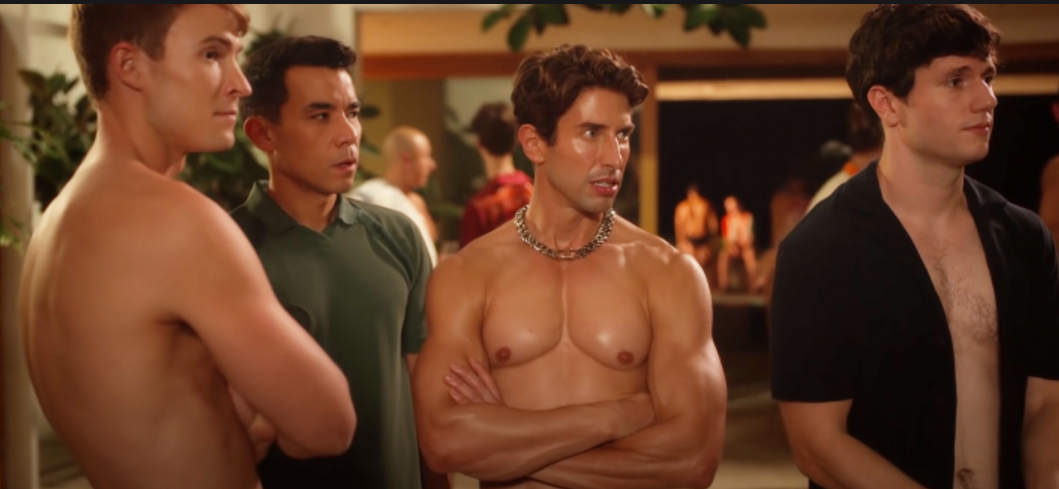interviews
A Love Letter to a Gay Haven During the AIDS Pandemic
Paul Lisicky on writing his memoir "Later" and living in a town where queerness was the dominant culture

A relationship to place is not dissimilar from one to a person. Anytime a text places geographic location at the heart, it’s like reading about a love too private to make public. Provincetown is that love for so many—it’s recently showed up in the works of Eileen Myles, Hanif Abdurraqib, and Carmen Maria Machado to mention a few—and Later: My Life at the Edge of the World is just another testimony of a town that has served as a safe haven for the outliers of society for so long.
In 1991, Paul Lisicky arrived in Provincetown looking for love, connection, and, most of all, a sense of community. The AIDS pandemic, which was at its apex, claimed at least one life a week, if not more. With funerals being held weekly, Later is a love letter to a community facing a dire crisis, a timeless reminder to find ways to feel love, joy, and anger when hopelessness permeates from every surface, and a testament to finding purpose and belonging in a world that offers limited space for you to begin with.
Even though the events in Later take place almost thirty years ago, its commentary on the legacy of crisis rings true today, especially when senators claim that responses to virus outbreaks have always been apolitical when the AIDS crisis was anything but. And while medicine such as Truvada for PrEP (which lowers the risk of HIV taking hold and spreading throughout the body) exists, erasure of individuals who’ve died is still a threat. It’s a conversation that can’t stop, because queer folks’ right to exist in the world is a fight that includes access to healthcare.
Greg Mania: You’ve written five books prior to this one, including your critically lauded memoir, The Narrow Door. Why was now the right time to write Later?
Paul Lisicky: In a time of so many emergencies (the climate crisis, the crisis at the southern border, the rancid politics, the opioid crisis, and now the Coronavirus), I couldn’t help but look back at another emergency: the earlier years of the AIDS pandemic and how it shaped daily life in Provincetown from 1991-94. Instantly the writing stirred up questions: how did we survive when dread was the fact of the day? How did we keep each other buoyed and energized and pissed off and laughing when we needed to laugh?
I’ve been thinking about what community means for years, maybe because I’ve since lived temporarily in so many places where I’ve felt isolated and out of sync, but in that particular place and time, I was a participant—or part of an experiment in which queerness wasn’t on the margins but was central, the dominant culture. I don’t mean to idealize, as the community I’m talking about was forged by a health emergency. But in terms of right now: how do we live? That’s the question I hope the book invites in you.
GM: Your book is a portrait of a haven for the fringes of society: the outsiders, anomalies, and artists that comprise of the community that has made Provincetown well known for its values and inclusion. You write about Provincetown—which you affectionately dub “Town”— as though as it’s a person: “Town does...Town wants…” Do you see it more as a person as opposed to a place, and, if so, how?
Joy is the life force that some people summon up when they need it, like breath or blood.
PL: Ah, great question. I definitely know Provincetown is part of the world of facts and history, but there’s another side of it that exists primarily in the inner lives of the people who love it. For those people—and I’m including myself in that group—it’s as much a myth as it is a place of streets and buildings and a harbor. It implies a dream of what a community could be—safe, energizing, inclusive—even if it’s often getting those things totally wrong. I’m glad to hear that the book made you think of Town as a person, because for anyone who first falls in love with it, it’s like the beginning of a romance or an infatuation. It can take your bearings away for a while.
GM: What is your relationship to Provincetown like now?
PL: The Provincetown of 2020 is different from the Provincetown of the book in that it’s super expensive. A single house that might have sold for $100,000 back in 1990 can go for at least $1.2 million now. I could say a lot about how that’s influenced the creative culture in town, and all of my remarks would be all too obvious—things we’ve already heard said about SoHo or Williamsburg or South Beach or San Miguel de Allende. So I’ll just say I go back pretty frequently, sometimes as often as once a month. I stay at my friend Polly’s place in the West End, which is a home to me, or at the Fine Arts Work Center, where I teach, in the summer. I’m in town frequently enough that it’s assumed I live there. When I say hi to acquaintances on the street, I don’t get the sense that anyone thinks I’m just visiting. That’s a good feeling.
GM: You catalog many beautiful memories during a time in which there were several funerals being held on a weekly basis. Why is it important to find joy during times of crisis?
PL: I think laughter and joy are often inevitable in these circumstances, maybe they’re simply aspects of release when it comes to extremity. I don’t know. Maybe joy is just the life force that some people summon up when they need it, like breath or blood. I don’t think it’s something that can be willed or engineered. It sneaks up on you, which is a part of what’s great about it.
GM: Why is continuing discourse about the AIDS crisis important even now in the age of prescription medicine like Truvada?
If we tell ourselves AIDS is in the past, we’re just lying and participating in the erasure of so many.
PL: Statistics are almost impossible to process, but here go a few: 38 million people in the world live with HIV today; a little less than 2/3 of them have access to antiretrovirals. A couple of weeks ago I heard that a million people globally died of AIDS just last year. It’s hard to feel facts like that—our centers of emotion don’t know how to hold onto them or make meaning. But if we tell ourselves AIDS is in the past, we’re just lying and participating in the erasure of so many.
GM: You grew up with a history of family trauma. Has writing this book helped you in any way make peace with your past? If so, how?
PL: That’s complicated because I never would have used the word trauma until recently. I never doubted my parents loved me, but my mother, in particular, was dealing with the residue of deep pain, and she came up in a time in which she wasn’t given the resources to manage. Deal with it—or, worse, bury it. Get normal. I think this book might be tougher on my parents than my other books, but I hope its candor is a way to getting to be close to them again, even though they’re no longer around. I hope any exasperation is just read as another form of love.
GM: What do you want young queer readers, from this generation and ones to come, to take away from this book?
What can you do, even if it’s very modest, for the people who will come after you?
PL: Queerness is so much about looking toward the future, maybe sometimes at the expense of the past, which we can’t help but associate with oppression and punishment. I’ve certainly been guilty of that kind of thinking. There’s a quote from José Esteban Muñoz that says it better than I can: “Queerness is not yet here…. Put another way, we are not yet queer. We may never touch queerness, but we can feel it as the warm illumination of a horizon imbued with potentiality.” But in order to inhabit that future, that potentiality, you need some grounding in the past, in the lives of people who came before you. How did those people—even if they were simply two men walking hand in hand on a city street in 1993—help make your world possible? What can you do, even if it’s very modest, for the people who will come after you?
But all of that sounds fairly lesson-y and Later is a book that’s wary of giving out instructions. I hope it’s a book that you take in like a long song, that you’ll read it once, then go back and enter individual passages, out of sequence, again and again. And replay it in your nervous system like one of your favorite albums.
GM: What are some other site-specific texts you had closeby while you wrote Later?
PL: Two that come to mind are Mary Heaton Vorse’s Time and the Town and Thoreau’s Cape Cod. There’s also Denis Johnson’s oddball Resuscitation of a Hanged Man if only for its descriptive weirdness. And though I didn’t exactly have them on my desk: Michael Cunningham’s Land’s End and my ex Mark Doty’s Heaven’s Coast and Dog Years, as well as his books of poetry from Atlantis through School of the Arts, which I read as they came into being. Everyone’s Provincetown is radically different. Provincetown has lots of flex: That’s one of the delights of reading someone else’s account of it.
GM: You have two novels, two memoirs, and one collection or prose under your belt. What’s next and what can you tell me about it?
PL: I’ve been working on a book about my father for the last five years. I’ve accumulated over a hundred pages, and published some individual sections, but it still hasn’t found its bonding agent. Frankly, I’m sort of surprised I haven’t been too bothered by that. Why does it need to be told? I’m waiting for that a-ha!— and I’m trusting that that will appear when I’m not trying.









